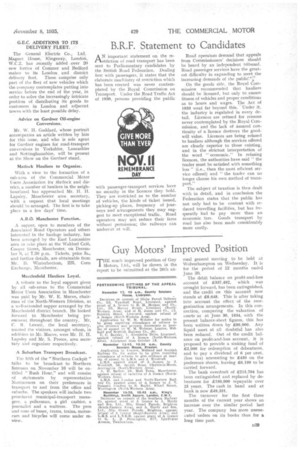B.R.F. Statement to Candidates
Page 119

If you've noticed an error in this article please click here to report it so we can fix it.
A"portant statement on the restriction of road transport has been sent to Parliamentary candidates by the British Road Federation. Dealing first with passengers, it states that the elaborate machinery of restriction which has been erected was never contemplated by the Royal Commission on Transport. Under the Road Traffic Act of 1930, persons providing the public
with passenger-transport services have no security in the licences they hold. They are restricted as to the number of vehicles, the kinds of ticket issued, picking-up places, frequency of journeys and arrangements they may suggest to meet exceptional traffic. Road operators may not reduce their fares without permission; the railways can undercut at will. Road operators demand that appeals from Commissioners' decisions should be heard by an independent tribunal. Road passenger services have the greatest difficulty in expanding to meet the increasing demands of the public'i: On the goods side, the Royal Commission recommended that hauliers should be licensed, hut only to ensure fitness of vehicles and proper conditions as to hours and wages. The Act of 1933 went far beyond this. Under it, the industry is regulated in every detail. Licences are refused for reasons never contemplated by the Royal Commission, and the lack of assured continuity of a licence destroys the goodwill value. Licences are being refused to hauliers although the services offered are clearly superior to those existing, and in the strictest interpretation of the word "economic." In refusing licences, the authorities have said " the trader must be satisfied with something less " (i.e., than the most efficient service offered) and "the trader can no longer choose his own method of transport."
The subject of taxation is then dealt with in detail, and in conclusion the Federation states that the public has not only had to be content with reduced travelling facilities, but has frequently had to pay more than an economic fare. Goods transport by road has also been made considerably more costly.












































































































































































































































































































